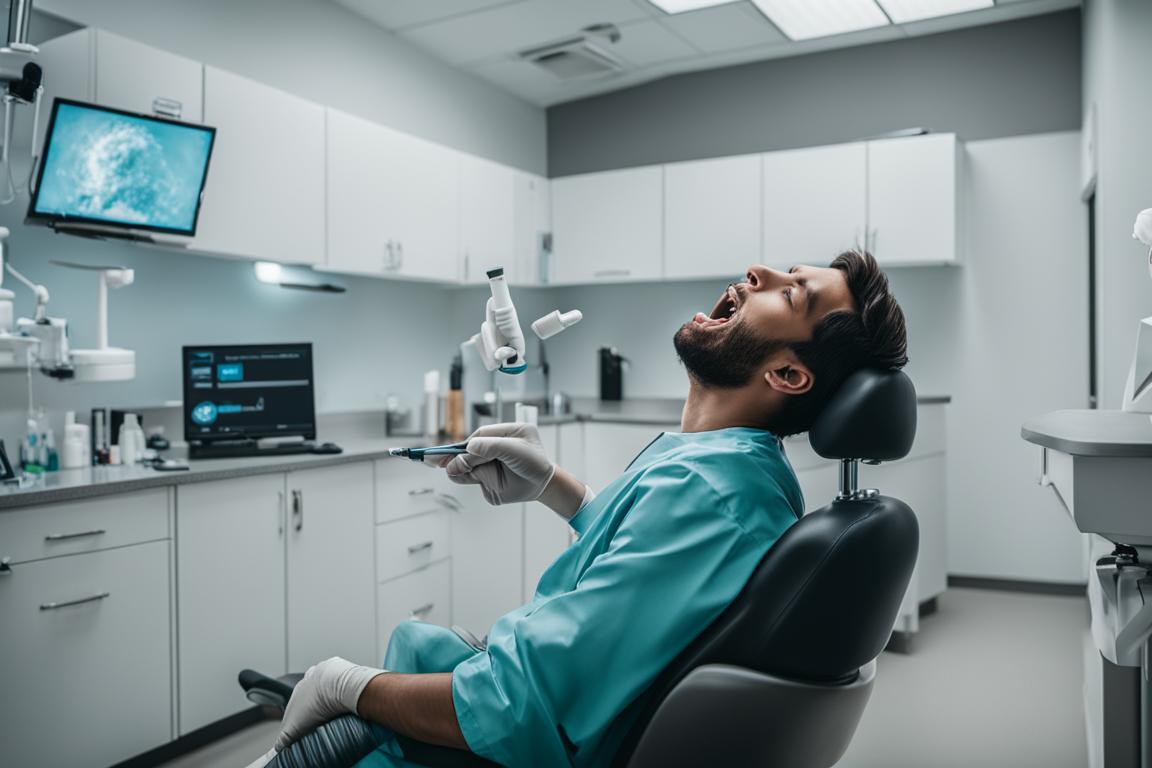Are you wondering why you can’t vape after wisdom teeth removal? Don’t worry, we have the answers for you. Vaping after wisdom teeth removal can have negative effects on your recovery and oral health. The heat, tar, and chemicals from vaping can irritate the healing tissues, potentially leading to infection and prolonged healing time. Smoking or vaping after oral surgery, such as wisdom tooth extraction, can also increase the risk of complications like dry socket, inflammation, gum disease, and slow healing. It is important to avoid vaping or smoking in order to promote a healthy recovery process.
Table of Contents
ToggleKey Takeaways:
- Vaping after wisdom teeth removal can irritate healing tissues and increase the risk of complications.
- The heat, tar, and chemicals from vaping can potentially lead to infection and prolonged healing time.
- Smoking or vaping after oral surgery can increase the risk of dry socket, inflammation, gum disease, and slow healing.
- Avoid vaping or smoking to promote a healthy recovery process.
- Consult with your dentist or oral surgeon for specific instructions on when it is safe to resume vaping.
The Dangers of Vaping
Vaping may seem like a trendy and harmless activity, but it comes with a host of risks and dangers to your health. Contrary to popular belief, vaping is not a safe alternative to smoking. Numerous studies and alarming reports have linked vaping to severe injuries and illnesses, highlighting the potential hazards it poses to individuals.

The aerosol produced by vaping devices contains harmful substances that can have detrimental effects on both respiratory and cardiovascular health. This aerosol is not just harmless water vapor; it consists of toxic chemicals, heavy metals, and potentially dangerous particulate matter. Inhaling these substances can lead to a wide range of health problems, both in the short-term and the long-term.
Studies have linked vaping to serious lung injuries such as bronchiolitis obliterans, also known as “vaping lung.” This condition damages the small airways in the lungs, causing symptoms like coughing, shortness of breath, and chest pain. In severe cases, it can lead to respiratory failure and necessitate lung transplantation.
Furthermore, vaping has been associated with an increased risk of seizures, strokes, and cardiovascular issues. The nicotine and other chemicals present in vaping products can have a profound impact on the cardiovascular system, potentially leading to heart attacks, hypertension, and arterial damage.
It is important to note that vaping can also result in nicotine addiction, as many vaping liquids contain high levels of this addictive substance. Nicotine addiction can have serious consequences for physical and mental health, leading to dependence, withdrawal symptoms, and an increased risk of using other tobacco products.
“Vaping is not a risk-free activity, and its potential dangers should not be underestimated.”
Additionally, it is essential to be aware of the risk of battery explosions associated with vaping devices. Faulty batteries or improper usage can cause these devices to explode, resulting in severe injuries to the face, hands, and other body parts. These injuries can be life-threatening and may require extensive medical treatment.
The Impact of Vaping on Oral Surgery Recovery
Vaping after oral surgery, including tooth extraction, can have serious consequences on the recovery process. The heat, chemicals, and suction from vaping devices can cause inflammation, gum disease, delayed healing, and the development of a condition called dry socket.
Dry socket is one of the most common oral surgery complications associated with vaping after tooth extraction. It occurs when the blood clot that forms in the extraction site is dislodged or dissolves prematurely, exposing the underlying nerves and leading to intense pain. Vaping can disrupt the formation and stability of the blood clot, increasing the risk of dry socket.
The nicotine present in vape liquid can also negatively impact oral surgery recovery. Nicotine constricts blood vessels and reduces blood flow to the extraction site, slowing down the natural healing process. This can prolong the recovery period and increase the likelihood of complications.
It is crucial to prioritize the health and healing of your mouth after oral surgery by refraining from vaping. The risks associated with vaping can undermine the success of the surgery and lead to additional oral health issues. By avoiding vaping, patients can minimize the risk of complications and promote a smooth recovery.
Remember to follow your dentist’s or oral surgeon’s post-operative instructions closely and seek professional guidance if you have any concerns or questions regarding your recovery.
| Risks | Description |
|---|---|
| Inflammation | Vaping can cause inflammation in the oral tissues, delaying the healing process and increasing the chance of infection. |
| Gum Disease | The heat and chemicals from vaping can contribute to gum disease, leading to further oral health complications. |
| Delayed Healing | Nicotine in vape liquid can impede the body’s natural healing process, prolonging the recovery period after tooth extraction. |
| Dry Socket | Vaping can disrupt the formation and stability of the blood clot, increasing the risk of dry socket and intense pain. |
When Can I Resume Vaping After Tooth Extraction?
After undergoing a tooth extraction, it is important to allow your body ample time to heal before resuming any activities that may potentially interfere with the recovery process. This includes vaping, which can have negative effects on the healing tissues and prolong your recovery time.
It is generally recommended to wait at least 48 to 72 hours after the tooth extraction procedure before resuming vaping. This timeframe allows the body to heal and the blood clot to form and stabilize in the extraction site, reducing the risk of complications such as dry socket.
However, it is crucial to follow the guidance of your dentist or oral surgeon, as they may provide specific instructions based on your individual case. Factors such as the complexity of the extraction, your overall oral health, and any underlying medical conditions can influence the recommended waiting period.
After the initial waiting period, it is advisable to proceed with caution when reintroducing vaping. Limit your vaping sessions and take precautions to protect the extraction site. Using gauze and keeping the wattage settings on your vaping device low can help minimize irritation and potential damage to the healing tissues.
Remember to maintain good oral hygiene practices as well. Brush and floss gently, being careful to avoid the extraction site, and rinse your mouth with an antibacterial mouthwash to help prevent infection.

Image: A visual representation of how long you should wait before vaping after wisdom teeth removal.
Conclusion
In conclusion, it is crucial to prioritize your oral health and recovery by avoiding vaping after wisdom teeth removal. Vaping can have detrimental effects on your healing tissues, delaying the recovery process and increasing the risk of complications such as dry socket. To satisfy nicotine cravings during the recovery period, consider using alternative options like nicotine patches or gums, which are safer for your oral health.
Following the instructions provided by your dentist or oral surgeon is essential for a smooth and successful healing process. Maintaining good oral hygiene, including gentle brushing and rinsing with saltwater, can help keep the extraction site clean and reduce the risk of infection.
Remember to give your body the time it needs to heal properly before resuming vaping or any other activities that may hinder your recovery. By adopting best practices for not vaping after wisdom teeth surgery, you can ensure a healthy and complication-free healing journey. Your oral health and overall well-being are worth the temporary sacrifice.
FAQ
Why can’t I vape after wisdom teeth removal?
Vaping after wisdom teeth removal can have negative effects on your recovery and oral health. The heat, tar, and chemicals from vaping can irritate the healing tissues, potentially leading to infection and prolonged healing time.
What are the dangers of vaping?
Vaping is not a safe alternative to smoking and has been linked to serious injuries and illnesses such as lung injuries, seizures, strokes, cardiovascular issues, nicotine addiction, battery explosion injuries, and even death. The aerosol from vaping devices contains harmful substances that can have detrimental effects on respiratory and cardiovascular health.
How does vaping impact oral surgery recovery?
Vaping after oral surgery, including procedures like tooth extraction, can lead to severe complications. The heat, chemicals, and suction from vaping can cause inflammation, gum disease, delayed healing, and dry socket.
When can I resume vaping after tooth extraction?
It is recommended to wait at least 48 to 72 hours after tooth extraction before resuming vaping. This timeframe allows the body to heal and the blood clot to form and stabilize in the extraction site.
What should I do instead of vaping after wisdom teeth surgery?
Instead of vaping, consider using alternatives like nicotine patches or gums for nicotine cravings during the recovery period. Follow the instructions of your dentist or oral surgeon, maintain good oral hygiene, and give your body the time it needs to heal properly.

